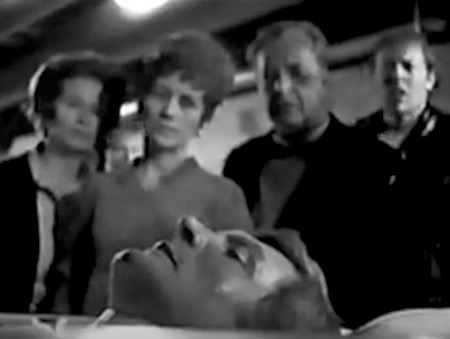While the 1971 telefilm Duel was the first standalone feature-length project that Steven Spielberg made as a professional, he directed two other pieces with commensurate running times the same year, namely the first weekly episode of the long-running detective series Columbo and this installment of a series called The Name of the Game. Given how central science fiction subsequently became in Spielberg’s work, L.A. 2017 is of particular interest. Additionally, L.A. 2017 plays like standalone piece because its only narrative connection to The Name of the Game is protagonist Glenn Howard (Gene Barry), who time-travels away from the series’ modern-day milieu for the duration of this adventure.
While driving through smoggy canyons in Los Angeles, socially conscious magazine publisher Glenn succumbs to noxious fumes and crashes his car. Emergency personnel wearing gas masks and protective suits extract Glenn from his vehicle and drive him to a sprawling underground campus. Through interactions with psychiatrist/policeman Cameron (Severn Darden) and high-powered politician Bigelow (Barry Sullivan), Glenn learns that he’s in the Los Angeles of the future, and that civilization has been driven underground by environmental degradation. Per the talky script by Philip Wylie, what ensues has more exposition than excitement. In this grim future, America functions as a corporation with totalitarian control over citizens. People exchange math equations instead of jokes, much of the population is sterile, and everyone is under constant surveillance. Given Glenn’s unique status as a man out of time, Bigelow asks him to become a propogandist for the government, but he rebels—with the assistance of Sandrelle (Sharon Farrell), an attractive woman assigned to be Glenn’s consort.
Watching L.A. 2017, it’s possible to discern why the piece, in tandem with Spielberg’s other 1971 work, helped raise his profile—the director does a lot with a little. Frenetic movement and tight angles make scenes in underground tunnels feel appropriately claustrophobic, and Spielberg guides actors portraying villains to underplay, which adds to the general air of menace. Moreover, the piece’s biggest shortcomings (flat scripting, meager budget) originated above the young director’s pay grade. While nowhere near as revelatory as Duel, this piece demonstrates that even in his earliest efforts, Spielberg had a formidable skillset. No wonder he graduated to theatrical features after a relatively short run as a Universal Television worker bee.
L.A. 2017: FUNKY


I think it's a terrific show and wrote an artica; about it for Filmfax magazine. Wylie's script, which he novelized, was almost entirely rewritten by producer Dean Hargrove. An amnulance with a machine gun under the hood---that's just one of the great touches.
ReplyDeleteActually, Spielberg spent the equivalent of four television seasons (from his initial Night Gallery assignment in the fall of 1969 to his last TV movie Savage in the latter half of the '72-'73 season) as a director in the Universal Television unit.
ReplyDeleteStone Cold Dead (1978)
ReplyDeleteMax, thanks for hipping me to "Stone Cold Dead." The presence of Paul Williams certainly caught my attention... However, the copyright on the poster indicates the U.S. release didn't happen until 1980.
ReplyDeleteHi Peter,
DeleteThat's a shame... I suppose a Canadian release of 1979 doesn't count?
Regardless, I've been a big fan of the blog for a long time now... I've always admired your tenacity as a viewer and your writing style as a reviewer.
In my own quest to watch every late 60s to 70s film starring Stacy Keach (was there another leading man during that time who had a more FUNKY/GROOVY/FREAKY career?) , I spotted a Keach film called "Two Solitudes" from 1978 that also eludes the blog.
I haven't tracked it down yet, but it's now on my priority list...
Big fan of Stacy Keach. In fact, I just read his autobiography. "Two Solitudes" is a Canadian-made film that probably never played in U.S. theaters, so, alas, it falls outside the scope of the blog.
ReplyDeleteDoes The Deadly Art of Survival (1979) fit the blog's criteria?
ReplyDelete